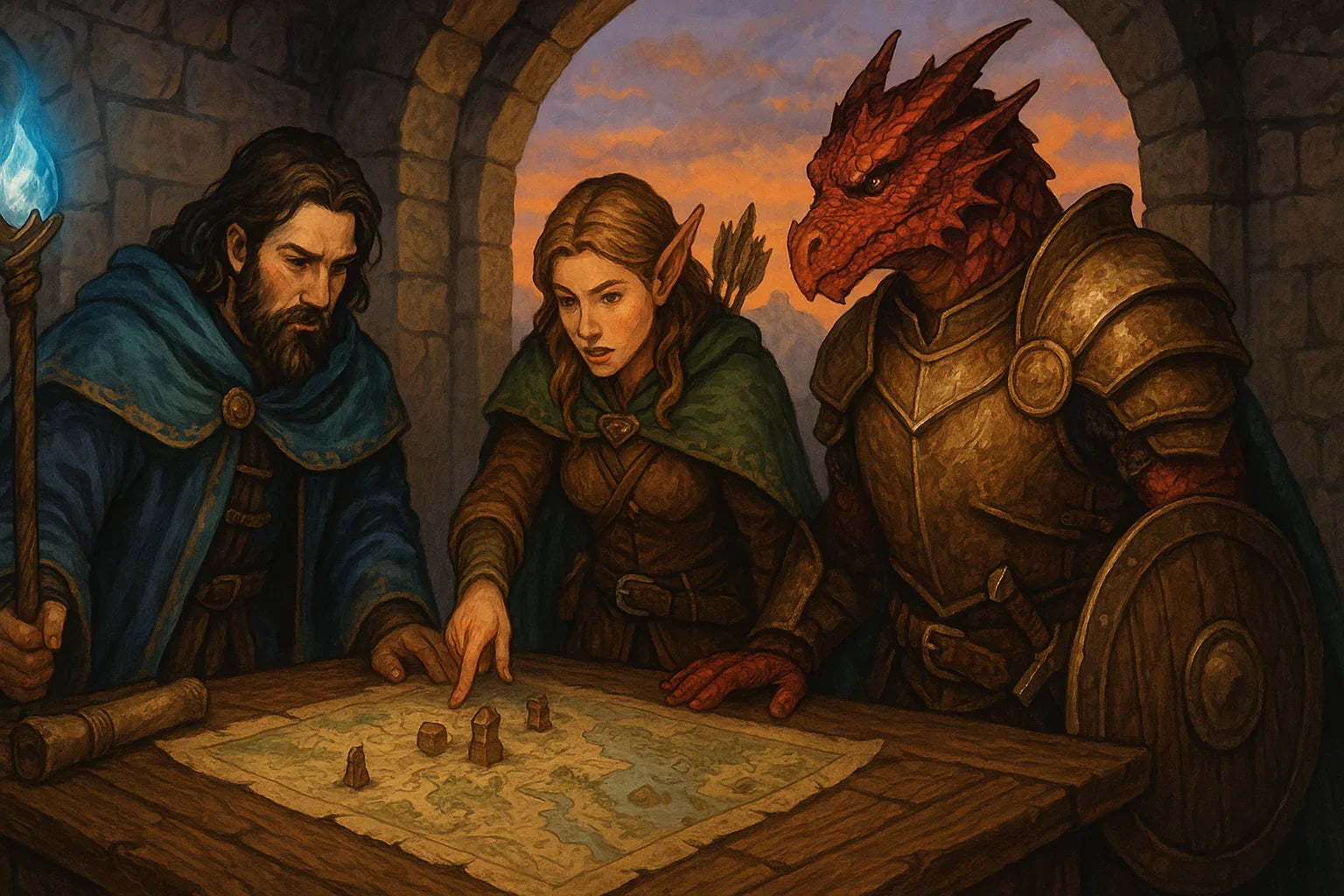
Design Balanced Rule Expansions for Tabletop Roleplay
Updated on: 2025-11-07
Table of contents for rules expansion for tabletop roleplaying
- Table of contents for rules expansion for tabletop roleplaying
- Common challenges with a rules expansion for tabletop roleplaying
- Comparison: tabletop RPG rules expansion options
- Summary and recommendations for a rules expansion for tabletop roleplaying
- Questions and answers about a rules expansion for tabletop roleplaying
If you’ve ever looked at a shelf full of books and wondered which rules expansion for tabletop roleplaying would actually improve your games, you’re not alone. The right tabletop RPG rules expansion or roleplaying game rules supplement can sharpen pacing, add exciting options, and solve recurring table problems. The wrong one can slow every scene. In this guide, we’ll break down how to pick a tabletop RPG sourcebook or supplemental rulebook that brings more fun to your table with less friction.
Common challenges with a rules expansion for tabletop roleplaying
Rules expansions are useful, but they introduce new moving parts. Here are the most common hurdles and how to clear them without stress.
Rule bloat without purpose
It’s easy to get excited and add everything at once. But more mechanics don’t always mean more fun. Before you adopt a roleplaying game rules supplement, ask what problem it solves. Does it fix a gap (like vehicle chases), streamline a clunky area (like crafting), or enable a theme your group wants (tactical skirmish, romance, intrigue)? If you can’t name a clear benefit in one sentence, park that rule for later.
- Start small: pilot one subsystem for two sessions.
- Use an opt‑in rule: players can try the new option, not must.
- Set a review point: after session two, keep, tweak, or cut.
Balance issues and power creep
New options sometimes outshine old ones. A tabletop RPG rules expansion that hands out too many bonuses can make encounters trivial or overshadow some classes. To prevent this, compare the new option to existing benchmarks. If it stacks with several other bonuses, cap it or swap a bonus for a flavorful drawback.
- Test against a “standard” build from your core rules.
- Use bounded accuracy guidelines or caps where your system supports them.
- Grant narrative trade‑offs (e.g., heavier gear slows stealth) to balance raw power.
Table pacing and complexity
Every added step can slow the game. If your rules expansion for tabletop roleplaying focusing on advanced combat mechanics adds several reaction triggers, interrupts, or conditions, make the bookkeeping visual. Use condition rings, initiative tents, or a simple table tracker so the action stays lively.
- Create a one‑page reference of the new mechanics everyone can glance at.
- Pre‑roll damage dice for frequent effects to speed resolution.
- Limit reaction chains: one reaction per round keeps turns snappy.
Practical accessories can help you keep turns moving and status clear. If you want durable gear and dice you can read at a glance, explore Runic Dice or browse all collections for set ideas that match your table’s style.
Compatibility with existing campaigns
Dropping a new subsystem into the middle of a campaign can jolt tone and difficulty. Introduce it in the fiction: an academy teaches a new duel style, a guild publishes a revised field manual, or ancient magic returns with rules your party uncovers. Give characters a short in‑world training montage and a session of low‑stakes practice before high‑risk scenes use the new rules.
- Announce the change at the end of a session and share a handout.
- Offer a limited respec if a character falls behind due to the change.
- Gate some options behind NPC training, downtime, or discoveries.
Comparison: tabletop RPG rules expansion options
Not all expansions serve the same purpose. Here’s how the main categories compare so you can match your goals to the right tool.
Official expansions from core publishers
These books are designed to sit beside your core rules, often with new classes, spells, monsters, or GM tools. They usually fit cleanly with the existing math and offer clear errata and support.
- Pros
- High compatibility and consistent language.
- Editorial oversight and balance passes.
- Ongoing support and clarifications.
- Cons
- Conservative design; fewer experimental mechanics.
- Content may overlap with what you already own.
Best for tables that want a safe, stable upgrade path without re‑teaching fundamentals.
Third‑party roleplaying game rules supplements
Independent designers often publish bold ideas that push systems into new flavors: gritty wounds, social combat, kingdom building, or hex‑crawl logistics. A third‑party tabletop RPG sourcebook can fill a niche the core line hasn’t touched yet.
- Pros
- Innovative mechanics and fresh genres.
- Focused solutions to specific table needs.
- Frequently modular and easy to extract.
- Cons
- Quality varies; balance may need house rulings.
- Less official support and errata channels.
Best for groups comfortable experimenting and customizing.
Homebrew and community supplemental rulebooks
From fan zines to community toolkits, these rules are often free or low‑cost and targeted at common pain points. Expect a mix of brilliant hacks and table‑specific quirks. Treat them like a buffet—sample, then choose your favorites.
- Pros
- Flexible and easy to remix.
- Broad community feedback and iterations.
- Great for quick fixes and one‑shots.
- Cons
- Inconsistent terminology across documents.
- May conflict with official modules or adventure assumptions.
Best for DIY tables that enjoy tinkering and co‑designing the experience.
Summary and recommendations for a rules expansion for tabletop roleplaying
Choosing the best rules expansion for tabletop roleplaying systems starts with knowing your group’s priorities: story depth, tactical crunch, exploration, or downtime play. Use the checklist below to narrow your shortlist and keep your sessions flowing.
Starter picks for new GMs
- Pick one goal. Example: “Make martial turns as interesting as spellcasters.”
- Adopt one module at a time. Two sessions of testing beats flipping between three books.
- Favor official or well‑reviewed supplements first for easier onboarding.
- Print a quick reference and keep it visible for the table.
If you’re still weighing options or want to learn more about our tabletop focus, read the story behind our craft on the About page.
Advanced combat mechanics choices
Looking to spice up combat without slowing it down? Focus on modules that change decisions, not just math. Good candidates include positioning rules that reward movement, risk‑reward maneuvers, simple environmental hazards, and streamlined reactions. A rules expansion for tabletop roleplaying that adds clarity to line‑of‑sight, cover, and timing can make every turn feel meaningful. Avoid stacks of tiny bonuses that only add arithmetic without new choices.
- Use zones or bands instead of precise distances if counting squares slows the group.
- Limit simultaneous trigger windows to avoid analysis paralysis.
- Adopt universal keywords (e.g., “staggered,” “suppressed”) to speed adjudication.
Session‑zero and onboarding tips
Even the best roleplaying game rules supplement shines only when everyone buys in. Run a short session‑zero to preview the new rules. Share examples, let players try a quick skirmish, and ask what felt clunky. Document one or two table rulings that clarify edge cases, and keep them consistent.
- Be explicit about goals: “We’re testing the chase subsystem to add tension to pursuits.”
- Give players a limited respec if the new rules change a build’s effectiveness.
- Revisit the module after three sessions; retire what no one uses.
Need help picking the right accessories to support your new module—like high‑contrast dice for quick reads or trackers for conditions? Reach out any time via Contact. We’re happy to chat about what’s worked at our own tables.
One last tip: treat every rules expansion for tabletop roleplaying as a living document. Keep what delights your group, trim what drags, and don’t hesitate to fold rules back into the core experience once everyone’s internalized them. Your table’s fun is the final authority.
Questions and answers about a rules expansion for tabletop roleplaying
What is a rules expansion for tabletop roleplaying and how does it change gameplay?
It’s an add‑on that extends your core rulebook with new options: classes, feats, monsters, crafting, downtime systems, or subsystems like mass combat. A tabletop RPG rules expansion changes gameplay by giving players and GMs more levers to pull. The best ones add decisions without bogging down turns. If an option only adds arithmetic or rare corner cases, skip it.
Which tabletop RPGs have the most comprehensive rules expansions?
Many popular systems receive both official and third‑party support, often covering advanced combat, exploration procedures, and campaign tools. Look for expansions that include clear guidance, examples, and a robust index. A comprehensive roleplaying game rules supplement balances player options with GM tools, so prep time goes down while session quality goes up.
How do I evaluate a tabletop RPG rules expansion for my group?
Use three quick tests: purpose, pacing, and payoff. First, state the purpose in one sentence. Second, test a single scene to see if turns stay brisk. Third, ask if the payoff (more drama or better choices) outweighs added complexity. If the answer is yes across the board, it’s worth adopting.
Do I need a supplemental rulebook for one‑shots or only campaigns?
One‑shots can benefit from modular rules that support the scenario’s theme: heists, duels, chases, or horror. Choose rules you can teach in five minutes and reference on one page. Campaigns can handle deeper systems, but the same principle applies—start small, test, and expand only when it improves the table’s experience.




















Leave a comment
This site is protected by hCaptcha and the hCaptcha Privacy Policy and Terms of Service apply.